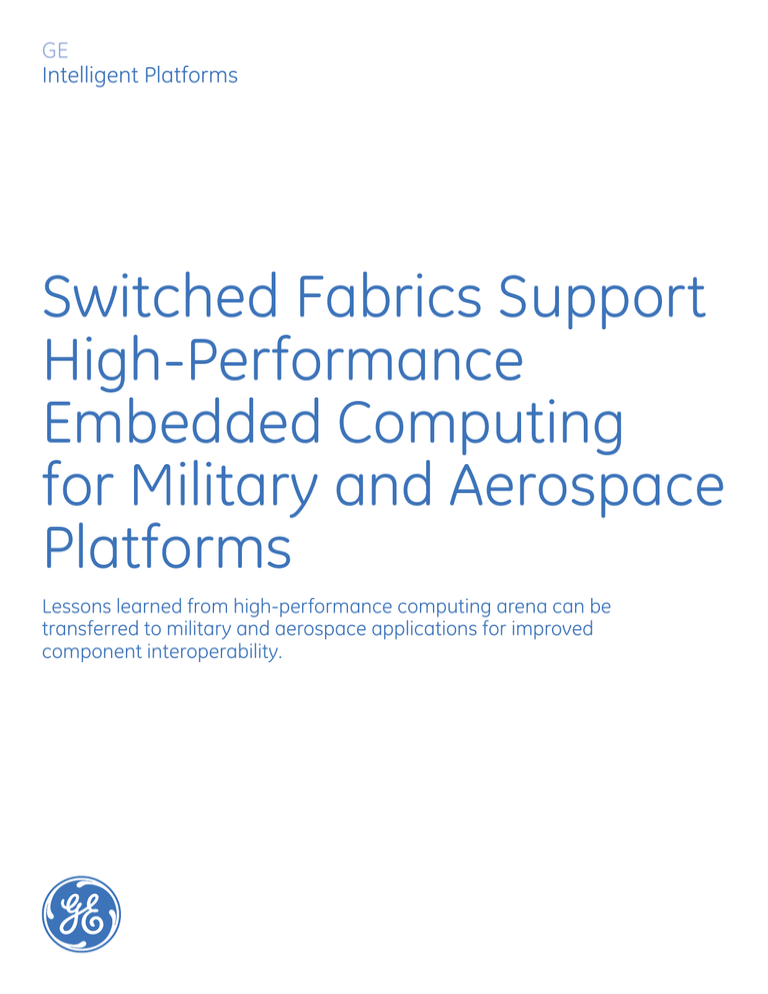
GE
Intelligent Platforms
Switched Fabrics Support
High-Performance
Embedded Computing
for Military and Aerospace
Platforms
Lessons learned from high-performance computing arena can be
transferred to military and aerospace applications for improved
component interoperability.
Switched Fabrics Support High-Performance
Introduction
Recent initiatives to increase the performance and flexibility
of modular platforms aimed at high-performance embedded
computing (HPEC) are bearing fruit by enabling board and system
designers to use high-speed switched fabrics from mainstream
high-performance computing (HPC) markets to maximize performance, reduce technical risk and shorten time to solution
for advanced military and aerospace applications.
This white paper explores how system integrators can leverage
the switched fabric networking technologies found in HPC systems
in the development of military and aerospace applications.
OpenVPX lays interoperability foundations
Industry leaders have adopted the OpenVPX (VITA65) standard
to create an expanding landscape of commercial-off-the-shelf
(COTS) boards, system backplanes and enclosures for rugged
deployed military and aerospace systems. 3U and 6U OpenVPX
form factors support high-speed signaling between boards within
multi-slot enclosures, giving system architects the freedom to create
optimized solutions for demanding intelligence, surveillance and
reconnaissance (ISR) applications such as radar, sonar, image and
signal processing.
OpenVPX provides a mechanical and electrical standard to support
interoperability of system modules including processor boards,
I/O cards, switch fabric modules (SFMs), system backplanes and
enclosures; however, the fabric protocol choices are left open to
board and system designers. The good news is there are many
fabric standards to choose from, such as PCIe, Serial RapidIO
(SRIO), Ethernet, 10Gigabit Ethernet (10GbE), Infiniband and others.
IPC leverages OpenVPX advantages
One way to extract the greatest benefit from the OpenVPX standard
is to harness proven, mainstream processor and interprocess
communication (IPC) technology from the HPC market. Such
platforms are widely used in a broad range of government, scientific,
financial and communications processing centers around the
world. Indeed, the latest TOP500 supercomputers list (www.
top500.org) provides some useful pointers to technologies that
can deliver much higher levels of computing performance along
with reduced technical risk and shorter time to market for size,
weight and power (SWaP)-constrained embedded solutions.
The very highest performance computers in the TOP500 list
use clusters of thousands of the latest multicore CPUs from
Intel along with thousands of NVIDIA’s many-core GPUs to
create petaflop machines based on commercially available
processors. These compute clusters are tightly coupled via
Infiniband and 10GbE remote DMA-enabled (RDMA) switched
fabric networks with robust, high-performance driver support
under LINUX and Windows operating systems. Such platforms
also benefit from a wide ecosystem of mainstream middlewares,
libraries and added value software to support advanced information
processing capabilities.
Access to a mainstream software is one of the most important
factors to consider when defining an embedded platform because
a large portion of the engineering effort required to field and support
a deployed system revolves around the performance and reliability
of the application code, which in turn depends on proven and reliable
operating systems, device drivers and IPC middlewares to deliver
the full potential of the system architecture.
Often the very latest CPU platforms are well-supported in the
open-source LINUX community by the time the chip vendors
launch their newest devices. In addition, software from industry
forums such as www.openfabrics.org and www.open-mpi.org
provide a rich ecosystem that attracts widespread engineering
support from thousands of developers from around the world.
2
HPC software modules provide development solutions
When combined with drivers and library support from Microsoft,
Intel, NVIDIA, Mellanox and other vendors, the HPC market provides
the widest possible set of proven and emerging software modules.
These modules can address the needs of system integrators and
application developers now and into the future across the whole
spectrum of applications from optimized DSP, math, image and
video processing libraries to advanced data processing, data
mining and artificial intelligence applications aimed at delivering
intelligence within an actionable time frame to support expanding
worldwide ISR mission profiles.
Conclusion
System integrators have a real opportunity to exploit mainstream
HPC capabilities by selecting GE’s latest open architecture HPEC
solutions as their go-ahead platform secure in the knowledge that
these architectures leverage mainstream hardware components
from the embedded product road maps of the major chip vendors.
GE Intelligent Platforms delivers best-in-class performance along
with sustainable advantage to military and aerospace OEMs and
system integrators by embracing mainstream HPC architectures
and long-term product support from industry leaders such as
Intel, NVIDIA and Mellanox.
GE Intelligent Platforms has introduced a new family of rugged
OpenVPX modules that bring mainstream HPC hardware and
software to the military and aerospace market. These COTS
platforms harness the latest Intel 32nm multicore 2nd Generation
Core i7 CPUs, new NVIDIA many-core GPUs and Infiniband/10GbE
RDMA network interface controllers (rNICs) from Mellanox to provide
game-changing levels of performance and scalability along with
robust software support from the HPC space.
About GE Intelligent Platforms
GE Intelligent Platforms, a General Electric Company (NYSE: GE), is an experienced high-performance
technology company and a global provider of hardware, software, services, and expertise in automation
and embedded computing. We offer a unique foundation of agile, advanced and ultra-reliable technology
that provides customers a sustainable advantage in the industries they serve, including energy, water,
consumer packaged goods, government and defense, and telecommunications. GE Intelligent Platforms
is a worldwide company headquartered in Charlottesville, VA and is part of GE Home and Business Solutions.
For more information, visit www.ge-ip.com.
GE Intelligent Platforms Contact Information
Americas: 1 800 433 2682 or 1 434 978 5100
Global regional phone numbers are listed by location on our web site at www.ge-ip.com/contact
www.ge-ip.com
©2011 GE Intelligent Platforms, Inc. All rights reserved. *Trademark GE Intelligent Platforms, Inc.
All other brands or names are property of their respective holders.
05.11 GFT-815
